Always Sleepy?
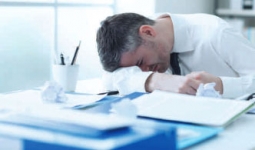
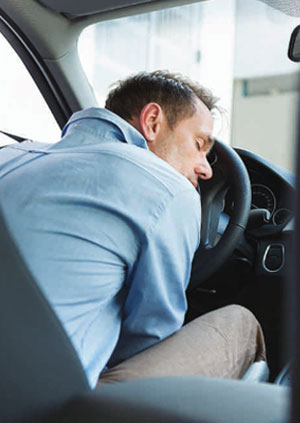
Do you find it difficult to concentrate or struggle to accomplish everyday task? Do you find yourself falling sleep or drowsy during conversation, watching TV or while driving? Or you’re suffering from headache in the morning?
If so, you may be the one of the people who suffers from Sleep Apnea.
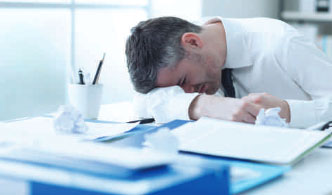
Sleep Apnea is a potentially sleep disorder in which breathing repeatedly stops and starts. It is due to the obstruction of the upper airway, caused by the throat muscles relaxing during sleep. The airway may be partially blocked or collapse completely, causing pauses and breaks in breathing, preventing air from entering the lungs and forcing the person to wake briefly to breathe before falling back to sleep again. The period of wakefulness is so brief that even though it may happen hundreds of times a night, the person usually won’t remember waking up, however, sleep will have been greatly disturbed.
Sleep apnea occurs in two main types:
Obstructive sleep apnea, the more common form that occurs when throat muscle relax and Central sleep apnea, which occurs when your brain doesn’t send proper signals to the muscles that control breathing. You may awaken with shortness of breath or have difficulty getting or staying asleep. The most common cause of central sleep apnea is heart disease, and less commonly stroke. Additionally some people have Complex sleep apnea, which is a combination of both.
If you think you might have sleep apnea, see your doctor. Treatment is necessary to avoid heart problems and other complications.
Symptoms
The most common symptoms of obstructive and central sleep apnea include:
- Excessive daytime sleepiness
- Loud snoring
- Breathing cessation during sleep
- Abrupt awakening accompanied by shortness of breath, which more likely indicates central sleep apnea
- Awakening with a dry mouth and sore throat
- Difficulty staying asleep (insomnia)
- Morning headache
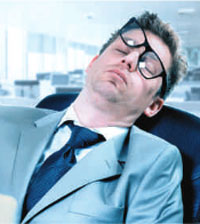
Many people don’t think of snoring as a sign of something potentially serious, and not everyone who has sleep apnea snores. But be sure to talk to your doctor if you experience loud snoring, especially snoring that’s punctuated by periods of silence.
Sleep apnea may occur if you are young or old, male or female. Even children can have sleep apnea. But certain factors put you at increased risk:
- Excess weight- fat deposits around your upper airway may obstruct your breathing. However, not everyone
- Who has sleep apnea is overweight. Thin people develop the disorder too.
- Neck circumference- The size of your neck may indicate whether or not you have an increased risk of sleep apnea.
- High blood pressure (hypertension)- Sleep apnea is not uncommon in people with hypertension.
- A narrowed airway- you may inherit a naturally narrow throat. Or, your tonsils or adenoids may become enlarged, which can block your airway.
- Being male-Men are twice as likely to have sleep apnea as women are. However women increased their risk if they are overweight, and the risk also appears to rise after menopause.
- Being older-Sleep apnea occurs two to three times more often in adults older than 65
- Family history-If you have family members with sleep apnea, you may be at increased risk.
- Use of alcohol, sedatives or tranquillizers. These substances relax the muscles in your throat.
- Smoking-Smokers are three times as likely to have obstructive sleep apnea than people who never smoked.
- Heart disorders-People with atrial fibrillation or congestive heart failure are more at risk of having central sleep apnea.
- Stroke or brain tumour. These conditions can impair the brain’s ability to regulate breathing.
Complications

Cardiovascular problems-Sudden drops in blood oxygen levels that occur during sleep apnea increase blood pressure and strain the cardiovascular system. The more severe your sleep apnea, the greater the risk of high blood pressure.
If there’s underlying heart disease, these multiple episodes of low blood oxygen(Hypoxia or Hypoxemia) can lead to sudden death from cardiac event.
Daytime fatigue- People with sleep apnea, may often experience severe daytime drowsiness, fatigue and irritability. You may also feel irritable, moody or depressed.
Complications with medications and surgery-Obstructive sleep apnea is also concern with certain medications and general anaesthesia. People with sleep apnea may be more likely to experience complications following major surgery because they are prone to breathing problems, especially when sedated or lying on their backs.
Sleep deprived partners- Loud snoring can keep those around you from getting good rest and eventually disrupt your relationships.
Test and Diagnosis
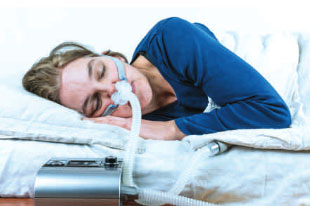
Your doctor may make an evaluation based on your signs and symptoms or refer you to asleep technologist.
Test to detect sleep apnea:
Nocturnal Polysomnography
During this test, you’re hooked up to equipment that monitors your heart, Iungs and brain activity, breathing patterns, arm and leg movements, and blood oxygen level while you sleep.
Treatment for Obstructive Sleep Apnea
For milder cases of sleep apnea, your doctor may recommend lifestyle changes such as losing weight or quitting smoking. If these measures don’t improve your signs and symptoms, CPAP is advised or in other cases surgery may be necessary.
Continuous positive airway pressure (CPAP)
If you have moderate to severe sleep apnea, you may benefit from a machine that delivers air pressure through a mask placed over your nose while you sleep. The pressure keeps your upper airway passages open, preventing apnea and snoring.
Surgery
The goal of surgery for sleep apnea is to remove excess tissue from your nose or throat that may be vibrating and causing you to snore, or may be blocking the airway causing sleep apnea.
Treatment for Associated Medical Problems
Possible causes of central sleep apnea include heart or neuromuscular disorders, and treating those conditions may help.
For Inquires Please Contact Pulmonary Medicine Department.



